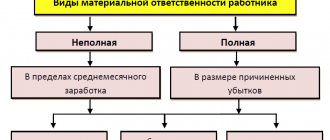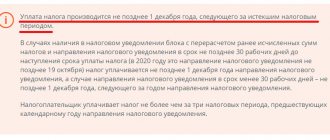Criminal liability for tax evasion: elements
Paying taxes is the constitutional duty of everyone in our country. There are various types of liability for failure to comply. The main one is tax liability provided for by the Tax Code of the Russian Federation.
We talk about it in detail in this section .
But for organizations, the consequences of tax violations are not limited to this type of liability. Firm officials are also subject to administrative and criminal liability.
This section of our website is about the latter.
So, the following acts in the tax sphere are punishable under the Criminal Code of the Russian Federation:
- evasion of taxes (fees) by an individual taxpayer—Art. 198;
- evasion of taxes (fees) by a company - Art. 199;
- failure to fulfill agency duties - Art. 199.1;
- concealment of money or property from collection of tax arrears - Art. 199.2.
Since August 2022, changes have come into force (Law “On Amendments...” dated July 29, 2017 No. 250-FZ), supplementing the provisions of Art. 198, 199 and 199.2 of the Criminal Code of the Russian Federation with reference to insurance premiums regulated by tax legislation, and Art. 199.2 - also mentioning contributions for injuries. Thus, previously absent criminal liability for non-payment of insurance premiums in 2022 turned out to actually exist.
When it is possible to be exempt from criminal liability for non-payment of fees, find out from this publication.
Let's look at each action in more detail.
What is tax or duty evasion
Evasion of taxes and fees means that an organization deliberately failed to fulfill its obligation to pay a tax or fee.
Evasion of taxes and fees involves non-receipt of funds into the budget.
Responsibility arises in case of tax evasion at any level: federal, regional or local.
More on the topic:
They will “talk to tax evaders in a new way”
What is tax evasion
As many as 2 articles of the Criminal Code of the Russian Federation are devoted to evasion of taxes and contributions: 198 and 199. According to the first of them, individuals are punished for failure to pay personal taxes. According to the second, officials of organizations are responsible. But in both cases, the objective side of the crime is the same - these are deliberate actions or inactions aimed at non-payment of taxes on a large or especially large scale and resulting in their complete or partial non-receipt into the budget. These actions may include:
- evading the submission of a declaration and other documents required by the Tax Code of the Russian Federation (a classic example for individuals is failure to declare income from renting out their property, for example, housing);
- in the inclusion of deliberately false information (for example, an individual underestimating the value of his own property sold).
IMPORTANT! Data about the object of taxation, calculation of the tax base, the availability of benefits, deductions and any other information affecting taxation are considered deliberately false.
Who is responsible for tax evasion
According to the Supreme Court of the Russian Federation, the person who was authorized to generate and submit reports to the Federal Tax Service and/or actually perform the functions of a manager related to the payment of taxes and contributions should be responsible. If these duties and powers were officially assigned to the accountant, then he will have to answer (see Resolution of the Plenum of the Armed Forces of the Russian Federation dated November 26, 2022 No. 48).
It will not be possible to evade responsibility even if the accountant quit at the time the violations were discovered and no longer works for the company.
In criminal law, there are two forms of guilt: intent and negligence.
Liability will arise if the investigator proves that the accountant acted with intent, for example, he deliberately prepared false reports and did not transfer the required amounts to the budget.
If a manager or chief accountant underpaid taxes through negligence, he cannot be held criminally liable (Resolution of the Constitutional Court of the Russian Federation of May 27, 2003 No. 9-P).
Responsibility for evasion for individual taxpayers
The punishment is influenced by the size of the amount the individual is evading payment: large or especially large.
A large amount is considered to be the amount (note 2 of Article 198 of the Criminal Code of the Russian Federation):
- from 900,000 rub. for 3 financial years in a row, if the share of non-payment is more than 10% of the amount of taxes, fees, and insurance premiums payable;
- exceeding RUB 2,700,000.
The sanctions for this are varied - starting from a fine of 100,000 rubles. and ending with imprisonment for up to 1 year.
A particularly large amount is recognized (note 2 of Article 198 of the Criminal Code of the Russian Federation):
- from 4,500,000 rub. for 3 years, provided that the share of unpaid taxes, fees, insurance premiums is more than 20% of the amount payable;
- exceeding 13,500,000 rubles.
Here the punishment is stricter: the minimum fine is 200,000 rubles, and imprisonment is possible for up to 3 years.
Persons who have evaded taxes for the first time can count on being exempt from criminal punishment if they pay the tax itself in full, pay penalties and fines provided for by the Tax Code of the Russian Federation.
When can a citizen be held criminally liable for tax evasion?
A citizen is held criminally liable for failure to pay taxes on a large or especially large scale, as well as if a tax return is not submitted or contains false information. Failure to pay taxes on a large or especially large scale is subject to a fine, or forced labor, or arrest (except for failure to pay on a particularly large scale), or imprisonment.
Conditions under which criminal prosecution for tax evasion is possible. A citizen can be held accountable for tax offenses if he has reached the age of 16 years. From the same age, it is possible to be held criminally liable for tax crimes (clause 2 of article 107 of the Tax Code of the Russian Federation; part 1 of article 20 of the Criminal Code of the Russian Federation). Bringing a citizen to criminal liability for tax evasion is possible if this act is committed (Article 198 of the Criminal Code of the Russian Federation; paragraph 5 of the Resolution of the Plenum of the Supreme Court of the Russian Federation of November 26, 2019 N 48): 1) in a certain way - by failure to submit a tax return or other documents to be attached to the tax return and serving as the basis for the calculation and payment of taxes, the failure to submit which or the inclusion of knowingly false information in which may serve as a method of tax evasion, or by indicating knowingly false information in the tax return or such documents.
2) in a large or especially large size.
Reference. Large and especially large amount in case of tax evasion by an individual A large amount is an amount of taxes that exceeds RUB 2,700,000 over a period of three consecutive financial years. A particularly large amount is recognized as an amount of taxes exceeding RUB 13,500,000 for a period within three financial years in a row. (Clause 2 of Notes to Article 198 of the Criminal Code of the Russian Federation).
Criminal prosecution is possible if the actions (inaction) of a citizen are clearly aimed specifically at tax evasion, that is, such actions (inaction) allow, for example, to hide the object of taxation, illegally reduce the tax base and, accordingly, the amount of calculated tax. If a citizen has committed such an offense for the first time and has fully paid the amount of the arrears, as well as penalties and fines, then he will not be held criminally liable (clause 3 of the Notes to Article 198 of the Criminal Code of the Russian Federation).
Initiation of a criminal case in connection with tax evasion To resolve the issue of initiating a criminal case against a taxpayer, the tax inspectorate is obliged to send relevant materials to the authorized investigative bodies if the following conditions are simultaneously met (clause 3 of Article 32, clause 3 of Article 108 of the Tax Code RF): 1) the decision of the tax inspectorate to bring the taxpayer to tax liability has been made and entered into force; 2) the taxpayer has been sent a demand to pay the tax, which he has not fulfilled in full (including the amounts of arrears, penalties and fines specified in the request) within the prescribed period; 3) two months have passed since the end of the period established for fulfilling the requirement to pay tax; 4) the size of the arrears (large or especially large) allows one to assume that an offense containing elements of a crime has been committed. Within 10 working days from the date of detection of these circumstances, the tax inspectorate sends materials to the investigative authorities (clause 6 of article 6.1, clause 3 of article 32 of the Tax Code of the Russian Federation).
Punishment for tax evasion If a citizen evades taxes on a large scale, one of the following penalties is possible (Part 1 of Article 198 of the Criminal Code of the Russian Federation): a fine in the amount of 100,000 to 300,000 rubles. or in the amount of wages or other income of a citizen for a period of one to two years; forced labor for up to a year; arrest for up to six months; imprisonment for up to a year. In case of tax evasion on an especially large scale, one of the following penalties is possible (Part 2 of Article 198 of the Criminal Code of the Russian Federation): a fine in the amount of 200,000 to 500,000 rubles. or in the amount of wages or other income of a citizen for a period of one and a half to three years; forced labor for up to three years; imprisonment for up to three years. It should be borne in mind that if a tax return is submitted to the tax authority and contains complete and reliable information, but the tax calculated on the basis of this declaration is not paid, then criminal prosecution is unacceptable. In this case, only penalties are collected (clauses 2 - 4 of Article 75 of the Tax Code of the Russian Federation; clause 19 of the Resolution of the Plenum of the Supreme Arbitration Court of the Russian Federation dated July 30, 2013 N 57; Letter of the Ministry of Finance of Russia dated October 18, 2017 N 03-11-09/68364) .
Possible cases of non-payment of taxes, which may lead to criminal liability Let us give examples of situations when it is possible to bring a citizen to criminal liability for tax evasion. 1. Failure to submit a declaration and failure to pay personal income tax on taxable income received from individuals not recognized as tax agents (clause 1, clause 1, clauses 2, 3, Article 228 of the Tax Code of the Russian Federation).
Example. Criminal liability for tax evasion For three years, a citizen receives a monthly income of 600,000 rubles. from renting out real estate owned by him and at the same time does not declare the income received and does not pay personal income tax. If this fact is discovered, the tax authorities will require you to declare the indicated income and pay tax, as well as penalties and fines. Over three years, unpaid personal income tax will amount to RUB 2,808,000. (RUB 600,000 x 12 months x 3 years x 13%). Under such circumstances, a citizen may be held criminally liable.
2. Failure to submit a declaration and failure to pay personal income tax on income from the sale of property owned by a citizen for less than three years, as well as from the sale of real estate acquired into ownership after 01/01/2016 and owned for less than the established minimum period (except for income received from 01/01/2021 from the sale of residential premises by parents (adoptive parents) of two or more children or by such children subject to certain conditions) (clause 17.1 of article 217, article 217.1, clause 2, clause 1, clauses 2, 3 Article 228 of the Tax Code of the Russian Federation; Part 3, Article 4 of the Law of November 29, 2014 N 382-FZ; Clause 8 of Article 3 of the Law of November 29, 2021 N 382-FZ). 3. Failure to submit a declaration and failure to pay personal income tax on income received from an organization recognized by a tax agent (for example, from an employer), upon payment of which tax was not withheld, which the tax agent did not report to the tax authority. In fact, this case includes wages paid to the employee “in an envelope” (clause 4, clause 1, clauses 2, 3, article 228 of the Tax Code of the Russian Federation).
The article material is taken from open sources
Do you have any questions for your lawyer on this topic?
Ask them right now here, or call us by phone in Moscow +7 (499) 288-34-32 or in Samara +7 (846) 212-99-71 (24 hours a day), or come to our office for a consultation (by pre-registration)!
Punishment for “position evaders”
Criminal punishment under Art. 199 of the Criminal Code of the Russian Federation may be subject to a person whose duties include signing reporting documentation on taxes (fees, contributions) and ensuring their full and timely payment. First of all, these are the manager and chief accountant or other specially authorized persons or persons who actually performed the duties of the manager or chief accountant.
The limits of liability are also determined by the amount hidden from the state. It speaks of a violation on a large scale (note 1 of Article 199 of the Tax Code of the Russian Federation):
- amount more than 5,000,000 rub. for 3 fiscal years in a row, provided that the share of unpaid taxes, fees, and insurance premiums is more than 25% of the amount payable;
- amount more than 15,000,000 rubles.
In this case, the main punishment will be a fine, arrest, forced labor or imprisonment for up to 2 years. In addition to the last two types of punishment, the convicted person may also be deprived of the right to hold certain positions or engage in certain activities.
Considered especially large:
- the amount is more than 15,000,000 rubles, if the share of non-payment is more than 50%;
- amount more than 45,000,000 rubles.
The penalties are similar to those above, but more severe. For example, the maximum term of imprisonment here is no longer 2 years, but 6 years. The same amounts of sanctions are threatened if the existence of a conspiracy by a group of persons is proven.
As in the case of individuals, it is possible for officials to apply for exemption from criminal liability if the crime is committed for the first time and the tax obligation is fulfilled in full, including penalties and fines.
IMPORTANT! Conviction of a manager for evasion gives tax authorities grounds to file a civil claim against him for damages caused to the budget by the criminal actions of the convicted person (see the decision of the RF Armed Forces dated January 27, 2015 No. 81-KG14-19). And such claims are often granted by the courts. Simply put, a criminal director may be required to pay the tax debt of the company he headed.
Conditions for liability for evasion of taxes or fees
A special condition for liability for evasion of taxes or fees is specified in Article 199 of the Criminal Code.
This crime must be committed:
- or on a large scale. A large amount is an amount of taxes, fees, insurance premiums that exceeds 15 million rubles over a period of 3 consecutive financial years (Part 1 of Article 199 of the Criminal Code);
- or on a particularly large scale. A particularly large amount is an amount exceeding 45 million rubles over a period of 3 financial years in a row (Part 2 of Article 199 of the Criminal Code).
To calculate large or especially large amounts of evasion of taxes, fees, and insurance premiums, it is necessary to add up both the amount of taxes, including for each type of tax, and the amount of fees and insurance premiums that were not paid for the period within 3 financial periods. years in a row.
In this case, one should take into account only the amounts of those taxes, fees, and insurance premiums that were not paid to the budgets of various levels after the expiration of tax or settlement periods for the types of taxes, fees, and insurance premiums.
Large (especially large) amounts of unpaid taxes, fees, and insurance premiums are calculated for a period within 3 consecutive financial years and in cases where the deadlines for their payment extend beyond this 3-year period and they have expired.
More on the topic:
Large and particularly large amounts of damage from non-payment of taxes in a new way
When the criminal is a tax agent
The crime of a tax agent is failure to fulfill only such duties as calculation, withholding and transfer of taxes to the budget. Evasion of other agency functions, for example, reporting to the Federal Tax Service about unwithheld tax, does not give rise to criminal liability.
IMPORTANT! For criminal prosecution under Art. 199.1 of the Criminal Code of the Russian Federation, the personal interest of the offender is required, that is, the commission of the acts in question in an effort to obtain any property or non-property benefits. If there is no such interest, then there is no crime involved, regardless of the amount of unpaid taxes. But if the acts were committed for mercenary reasons and are associated with the illegal withdrawal of money for one’s own benefit or for the benefit of other persons, in addition to the “agency” criminal article, theft may also be charged.
Under this article of the criminal law, the subject of liability may be an individual entrepreneur or an official of an organization responsible for the above duties. And just as in the cases discussed above, the amount of liability is determined by the scale of the tax amount. The gradation “large - especially large” is carried out according to the above parameters of Art. 199 of the Criminal Code of the Russian Federation. The sanctions are similar: from a fine of 100,000 rubles. up to 6 years in a correctional facility.
What is tax evasion?
The crime of evasion of taxes or fees can be expressed as:
- failure to submit a tax return, calculation or other documents, the submission of which is mandatory;
- inclusion of knowingly false information in a tax return, calculation or such documents.
Inclusion of knowingly false information can be done by:
- deliberate failure to reflect data on income from certain sources, objects of taxation;
- reduction in actual income;
- distortions in the amount of expenses incurred that are taken into account when calculating taxes (for example, expenses deducted when determining total taxable income).
Deliberately false information may also include data that does not correspond to reality about time, the period of expenses, income received, distortion in the calculations of physical indicators characterizing a certain type of activity, etc.
Previously on the topic:
Responsibility for loss of primary documents
Incorrectly claiming a tax deduction is not fraud.
What will happen to hiding property from foreclosure?
For concealing money and property from tax authorities, at the expense of which they could forcibly collect arrears, in a large amount (in this case, it is 2,250,000 rubles - Article 199.2, note to Article 170.2 of the Criminal Code of the Russian Federation) will be punished:
- a fine of 200,000–500,000 rubles. or in the amount of the convicted person’s income for a period from 18 months to 3 years;
- forced labor for up to 3 years;
- imprisonment for up to 3 years.
The same acts committed on an especially large scale (the amount exceeds 9,000,000 rubles, Article 199.2, note to Article 170.2 of the Criminal Code of the Russian Federation) are punishable by:
- a fine in the amount of 500,000 to 2,000,000 rubles. or in the amount of the convicted person’s income for a period of 2 to 5 years,
- forced labor for up to 5 years;
- imprisonment for up to 7 years.
In addition to forced labor and imprisonment, they may also be prohibited from holding certain positions or engaging in certain activities - up to 3 years.
Not only the head of the company, but also its owner can be held accountable for this crime.
Sanctions under Article 199 of the Criminal Code
Punishment for tax evasion:
- fine from 100,000 to 300,000 rubles;
- a fine in the amount of wages or other income of the convicted person for a period of one to two years;
- arrest for up to six months;
- imprisonment (or forced labor) for a term of up to two years with or without deprivation of the right to hold certain positions or engage in certain activities for a term of up to three years.
This is what it says in part one of Article 199 of the Criminal Code.
If there are aggravating circumstances, the punishment is more severe:
- imprisonment for a term of up to six years with simultaneous deprivation of the right to occupy leadership positions or conduct certain activities for a term of up to three years or without it;
- forced labor for a term of up to five years with or without deprivation of the right to hold certain positions or conduct certain activities for a term of up to three years;
- fine from 200,000 to 500,000 rubles;
- a fine in the amount of wages or other income of the convicted person for a period of one to three years.
This punishment is applied in two cases:
- if the crime was committed by the manager and the chief accountant by prior conspiracy;
- if the company evaded paying taxes on a particularly large scale.
This is stated in part two of Article 199 of the Criminal Code.
The term “evasion” indicates that the manager or chief accountant wants to avoid paying taxes, and not postpone it to a later date. If taxes were calculated correctly, but no money was paid to the budget (regardless of the reasons), it is impossible to punish the head of the company for tax evasion.






